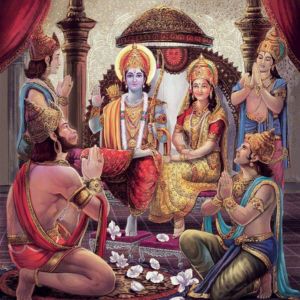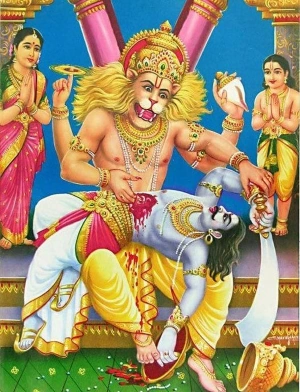What is Karma?
Karma literally means action.
In Hinduism, Karma means the law of causes and effects.
It is important to note that an action and its consequence are inseparable even though the consequence is experienced later.
Every action is of triple nature: it is connected to the past, present, and future.
अकारणं कथं कार्यं संसारेऽत्र भविष्यति। (Devi Bhagavatam)
Nothing happens in this world without a cause.
Why is it important to know about Karma?
A ship without a captain is helpless in the sea.
It is just tossed around by the winds and currents.
It can not move in a particular direction or reach a specific destination.
But a captain knows how the wind works, he knows the rules of navigation.
He knows which current to take advantage of and which one to avoid.
Basically, he knows the laws of the sea and takes control of the course of the ship.
In the same way, it is necessary for man to understand the law of Karma to make his life meaningful and progressive.
Is Karma a commandment?
Law of Karma is not a commandment.
It is just a statement like how you say 'water boils at 100 degree celsius'.
It is not insisting that you should boil water.
It is just giving you information that if you want to boil water, you should bring it to 100 degree celsius.
The sequence of Karma
The sequence of Karma is Desire - Thought - Action.
Thoughts are energized by desires.
Thoughts lead to actions.
Desire - the trigger of Karma
Whenever a desire arises in the mind like 'I want to eat an apple', man gets attached to the object of desire.
He should go to a place where apples are there or get one to where he is.
Both of these involve work.
Desire does not understand whether its fruit is good or bad.
There is no self restricting mechanism.
Desires keep on rising in the mind.
Man should use his intelligence to understand the consequence of the particular desire and decide whether to pursue it or not.
Man should desire only for objects that would give him long-term well-being and happiness.
Then he will get opportunities to achieve them.
Man becomes what he thinks
It is important to understand that Brahma created the world out of his thoughts.
Thoughts are behind creative power.
Action is thought materialized.
Man's behavior and character are also based on his thoughts.
What he thinks now, he will become that eventually.
If his thoughts are noble, he will become noble.
If his thoughts are evil, he will become evil.
Knowing this, man should fill his mind with good and elevating thoughts.
Circumstances are created by your own action
Whatever circumstances you find yourself in, they are all consequences of your own past actions either from the present birth or past births.
If you have not worked towards achieving happiness, you will never achieve happiness.
If you spread happiness around, you will find yourself in happy circumstances.
If you spread misery around, you will find yourself in miserable circumstances.
Some misconceptions about Karma
The law of Karma does not say that you are just a slave in the hands of a pre-decided destiny in which you have no role to play.
If at all there is a destiny, then it is self-made.
The law of Karma says that you yourself are responsible for your present and future.
You are not a helpless being like the captainless ship once you understand the law of Karma.
You can desire, think and act appropriately to decide what future you want for yourself.
Understanding the law of Karma, you can attain even immortality and liberation.
It is not harmful for you if you help someone suffering his Karma.
A man can not undergo the consequences of his Karma all by himself.
He needs 'agents' around him to make that happen.
If you get an opportunity to help someone, it only means that his Karma has exhausted and you are the 'agent' through whom he gets relief.
If you don't help, then you are creating bad Karma for yourself.
You are blocking any help that you might need in future.
Three types of Karma
Karma is of three types: Sanchita, Prarabdha, and Vartamana.
Sanchita Karma - It is the total accumulated Karma of all your past births.
Prarabdha Karma - It is that part of Sanchita Karma which is now ready to give its result.
Vartamana Karma - It is the Karma that you are creating presently. It is also called Agami Karma.
There is no escape from undergoing the Prarabdha Karma.
प्रारब्धकर्मणां भोगादेव क्षयः
It can be exhausted only by experiencing its consequences.
Sanchita Karma can be modified.
Harmful tendencies can be reduced, good ones can be strengthened.
But the results will be experienced only in subsequent births,
Vartamana Karma can be balanced out with present actions.
If you exercise control over your present desires, thoughts, and actions, then you can shape up your future as you want.
This is as far as individual Karma is concerned.
In addition to this, there is universal Karma which rules over everyone including the Gods.
Comments
Recommended for you
What do twitchings and pulsations on the body indicate?
 Click here to know more..
Click here to know more..
Mantra for affinity between brothers and sisters

om kleem. bharataagraja raama. kleem svaahaa.....
Click here to know more..Narasimha Bhujanga Stotram

ri'tam kartumevaashu namrasya vaakyam sabhaastambhamadhyaadya aavirbabhoova.....
Click here to know more..
English Topics
Rare Topics
Click on any topic to open
- 237 The Practice of Bhojana Sadhana
- 236 Words of Wisdom - 2
- 235 Defining Goodness - Sanatana Dharma's Perspective
- 234 Vibhishana in Ramayana - A Tale of Morality, Loyalty, and Redemption
- 233 God will not let you break
- 232 A Glimpse into the 64 Arts
- 231 Chembai Vaidyanatha Bhagavatar - A Carnatic Maestro's Musical Odyssey
- 230 Understanding Adhyāsa: A Closer Look at False Attribution
- 229 Is Family's Permission Necessary For Becoming Sanyasi ?
- 228 Faith In Upasana
Please wait while the audio list loads..
30
Ganapathy
Shiva
Hanuman
Devi
Vishnu Sahasranama
Mahabharatam
Practical Wisdom
Yoga Vasishta
Vedas
Rituals
Rare Topics
Devi Mahatmyam
Glory of Venkatesha
Shani Mahatmya
Story of Sri Yantra
Rudram Explained
Atharva Sheersha
Sri Suktam
Kathopanishad
Ramayana
Mystique
Mantra Shastra
Bharat Matha
Bhagavatam
Astrology
Temples
Spiritual books
Purana Stories
Festivals
Sages and Saints
